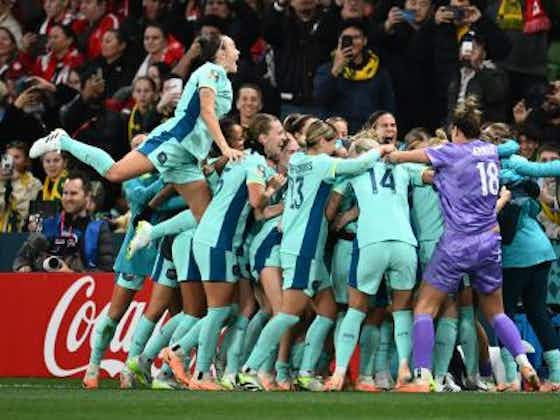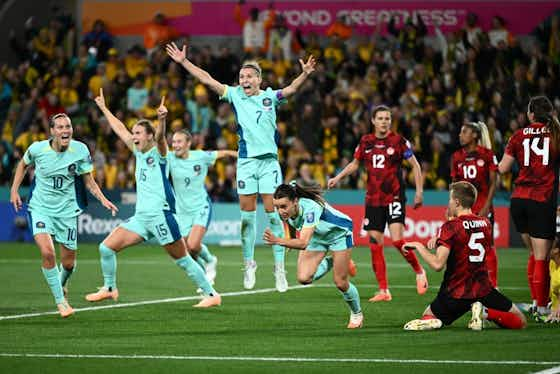The Guardian
·31 July 2023
Australia storm into Women’s World Cup last 16 as rout sends Canada out

In partnership with
Yahoo sportsThe Guardian
·31 July 2023

True to their catchphrase, the “Never Say Die” Matildas were not going to die wondering. In the biggest match in their 45-year history, with the weight of a nation on their shoulders, Australia were in vintage form in Melbourne on Monday night. Showing the composure and attacking flair that had deserted them in their first two matches, the Matildas secured a berth in the last 16 with a four-goal thrashing of the Olympic champions Canada.
It was a must-win clash – and the Matildas duly triumphed. Victory was vindication for the head coach, Tony Gustavsson, who had faced increasing criticism after his side narrowly beat the Republic of Ireland to open the tournament and then lost against Nigeria four days ago.
Those memories were swiftly forgotten on Monday, as four unanswered goals – two from Hayley Raso, one from Mary Fowler and a penalty from Steph Catley – showed the Matildas’ attacking class and defensive solidity. Canada managed barely a handful of shots on target all evening.
The convincing win – Australia’s biggest at the World Cup – leaves them top of Group B, after Ireland and Nigeria played out a goalless draw in Brisbane. The Matildas will face the runners-up of Group D, likely to be Denmark or China, in Sydney in a week’s time. Canada, having entered the match in pole position to qualify for the knockout round, now find themselves the first heavyweight team to exit the tournament.
As the Matildas walked out for their warm-up, a full moon beamed down and an Australian classic blared: New Sensation by INXS. But there was nothing new about this particular sensation – while the Australians went through their paces the captain, Sam Kerr, stood still. Since she sustained a calf injury on the eve of the tournament, the Matildas have sweated on her fitness. Her dazzling pink boots were on but she remained clad in a heavy jacket; Kerr started on the bench and looked set to stay there for this critical encounter.

No matter. Following a nervy opening period of play, Australia’s Arsenal duo Catley and Caitlin Foord began to combine dangerously on the left-hand flank. With the forward Fowler returning to the starting XI following a concussion, Foord shifted wide to great effect.
Less than 10 minutes in, Foord dispatched Catley with a perfectly placed ball, her teammate just managing to keep it in play. The Matildas captain’s cross bounced through the heart of the Canada defence before finding Raso on the edge of the box. One touch, two touches, and drove the ball past the diving goalkeeper Kailen Sheridan.
The capacity 27,706 crowd in Melbourne went wild. And then, belatedly, a lineswoman raised her flag. Offside? Canada moved to reset, before first the big screen and then the referee, Stéphanie Frappart, indicated a VAR review. The crowd held its collective breath. A minute passed in anxious silence. Then suddenly: goal. The crowd did not bemoan getting a second opportunity to celebrate.
VAR would rear its ugly head again. Later in the half, with the Australia counterattack continuing to prove potent, Fowler placed the ball for the on-rushing wing-back Ellie Carpenter. The Canada defender Jayde Riviere’s scuffed clearance found its way to Raso again, whose shot was deflected into Sheridan and bounced away. Pandemonium ensued in the six‑yard box before Fowler, wearing her trademark black gloves to ward off the Melbourne winter, charged at the ball and smashed it into the net: 2-0.
Or not. After the Matildas had celebrated and the crowd again roared, Frappart indicated another VAR check. This one took longer, as the Frenchwoman – who made history as the first female referee to officiate a men’s World Cup match last year – pondered whether Carpenter’s trailing back heel had been millimetres offside. Apparently it had. A marginal call at best, and the partisan crowd let their feelings be known.
They needn’t had worried. Minutes later the Matildas scored once more – a corner from Kyra Cooney-Cross pinballing around on the goalline before Raso instinctively swivelled barely a metre from goal and put it into the net. Australia then launched a rearguard action to take the two-goal lead into half-time, although the tension got to Gustavsson, who earned a yellow card for his sideline antics.

The Canada coach Bev Priestman rang the changes at half-time, using up four of her five permitted substitutions out of the dressing room. But the bold move failed to pay dividends when the Matildas extended their advantage in the 58th minute.
It was again Catley and Foord, the club and country teammates showing the advantage of their strong working relationship, causing danger on the left. Foord dribbled this way and that as she moved towards the byline, before finding an unmarked Fowler in the six-yard box. The 20-year-old hit the Canada post – for a moment it seemed Fowler would have to lunge for the goal again, but it bobbled over the line.
Despite Canada chasing the game, the Matildas had the better of the chances as the second half wore on – Fowler almost scoring another, and the Australia goalkeeper Mackenzie Arnold being more troubled by a yellow card for time wasting than Canada’s forward line. Eight minutes of added time only provided more opportunities for the Matildas to punish Sheridan – including when VAR awarded Australia a penalty for a foul on Katrina Gorry, calmly dispatched by Catley.
And so, after all the nationwide anxiety of the past week, the Matildas sail through from the group stage at their home World Cup. It is the first time Australia have topped their World Cup group. Never say die indeed.






























































